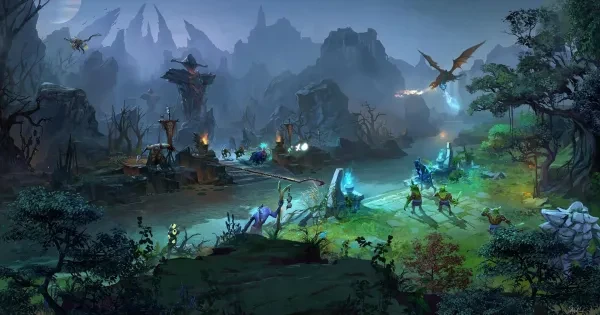The DeanBeat: Stanley Pierre-Louis on why games are getting respect
[ad_1]
Interested in learning what’s next for the gaming industry? Join gaming executives to discuss emerging parts of the industry this October at GamesBeat Summit Next. Register today.
The recent Games for Change Festival in New York presented refreshing looks about the positive impact of games, particularly during the pandemic.
I attended the event for the first time in-person last week in Times Square, and I sat down for a fireside chat with the ever cheerful Stanley Pierre-Louis, CEO of the Entertainment Software Association.
He’s cheerful in part because the numbers are going his way. A total of 66% of Americans, or 215.5 million people, play video games, and attitudes toward games have gotten more positive during the pandemic, according to the ESA’s 2022 Essential Facts About the Video Game Industry study. The survey found that 97% of all Americans (with the exception of some news commentators) now see the benefits of video games. The report says people believe that video games have brought mental health benefits during the pandemic.
The report says that 89% of players say video games provide stress relief, while 88% say video games help improve cognitive skills. It also says 88% percent of players agree that video games bring different types of people together, while 83% say games introduce people to new friends and relationships, a five percentage point increase from 2021.
This is a very different picture from when I was growing up. Games used to be nerdy. And now they’re cool, even if your parents are playing them. As speakers at Games for Change pointed out, games have branched out to have broader social impact, addressing a wide array of topics from climate change to nuclear war. They’re viewed as beneficial for skills development, mental health, and community building. About 88% of players agree that video games bring different types of people together.
We touched on this newfound respect for gaming in our fireside chat, and I peppered Pierre-Louis with a couple of questions about next year’s E3 2023 event, which is expected to take place in person under the new management of Reed Pop. He didn’t tell me any secrets. He also turned the tables and asked me a question.
Here’s an edited transcript of our fireside chat.

GamesBeat: I grew up playing games, especially at the tabletop stage. My mother would set it up in the morning, and then she would say, “Clear off the table,” or else she’d bring out the vacuum. It’s nice to see that video games have come from this nerdy place. That’s always near and dear to our hearts. But now games are getting respect, which is interesting to see. Stan, when we were doing our pre-call, you mentioned that the narrative around video games has been about the words “defensive,” “normalized,” and now “celebrated.” Do you want to talk more about that?
Stanley Pierre-Louis: The video games sector really grew out of amazing technology and ideas. But it was often misunderstood, and often blamed for things. As the leader of the ESA, in our history, we spent the first 15 years or so of our existence defending the right to make and sell games. It’s strange to think of it that way, but the art form and the innovations around it were under attack. Even after the Supreme Court decision that made it very clear that video games are high art, that they are on the same level as other forms of expression, and were defended vigorously by Justice Antonin Scalia, we found ourselves still dealing with the residual effects.
We spent a good amount of time thinking about how to re-introduce games to people and society as what we all understand them to be, which is a powerful medium that can heal, that can educate, that can bring us together. We’ve seen this period of globalization where we’ve begun to see how game technology has impacted other fields.
The other thing that we did collectively – not just the ESA, but as a community – was to point out how games intersect with our lives. We released a study a few weeks ago on essential facts about the video game industry. We talked about the sheer number of people who play. Two-thirds of Americans play video games. Someone in your life plays video games. When we talk to someone about this, we personalize it this way before we get to the issue. “Does anyone play games in your life?” Eventually maybe my wife, my son–”I’m not a big video gamer myself, but my dad had me buy Flight Simulator, because he’s a former Air Force pilot.” Bringing that into the conversation. “I guess you’re right. I had to buy an Xbox to do that.”

Some of it’s terminology. Some of it’s showing how it interacts with their lives. We’re in this place where people really appreciate the numbers. One of the numbers in our report was that 97 percent of all Americans – not just people who play video games, but all Americans – find that video games can have benefits in your life. That’s a stunning comment compared to where we were 10 or 15 years ago, even though it’s something that we’ve all believed forever.
GamesBeat: Some of this is also very recent, when you think about the narrative of video games before the pandemic and after. Hopefully after. The WHO was talking about addiction a lot before the pandemic. During the midst of that, the message changed, and they started talking about mental health benefits of playing together, socializing through video games when we couldn’t get together in real life. It feels like some of the perception of video games has started to match the reality.
Pierre-Louis: We even saw, in our studies–the numbers we talked about with respect to mental health and mental well-being were all up. If I remember correctly, mental stimulation was up something like four percent pre-pandemic compared to where we are now. Joy was up something like three percent. All the numbers around how games impact people, they were higher during the pandemic years. In part I think it’s because playing games helps us escape, but more important, it connects us. Those numbers were up huge.
Before the pandemic, I remember 65 percent of people played video games together with someone in person or online. Today it’s 83 percent. That’s an 18 percent jump in two years of people playing together. We think that has a correlation to why people feel better about games. It’s not just about games, which are amazing and innovative. It’s also about the community we form around them. It’s very customized to what you want. It could be around your family, your friends, the game itself. But those things fuel the energy around what games do.

GamesBeat: It feels also like the broadening of the subject matter of games has helped with this narrative. We can talk about how games allow us to do good, to be good, or otherwise have social impact.
Pierre-Louis: They really do. One of the themes I’ve seen in many of the talks at this year’s Games for Change Festival has just been about opening up opportunities for new and underrepresented voices. That’s something you can do in video games. You can share a perspective that’s very personal, yet it reaches a lot of people. We’re also talking about games that hit on different subjects and themes, and can do so in a powerful way, because the video game community wants to see that and experience it.
It also means that video games help with a lot of life skills that people underappreciated before. Communication skills. Conflict resolution. Empathizing through video game play. Games really introduce us to new themes, but also to skill sets that help us interrelate with other people.
GamesBeat: What kind of policy matters do you still want to address? Are there more opportunities you see for changing perceptions?
Pierre-Louis: ESA serves as the voice and advocate for the video game industry and community. That means we spend the overwhelming majority of our time talking to state and federal legislators, policy makers, and other civic leaders, talking about the value that video games bring. For the first 10 or 15 years of our existence as an organization, we really were focused on legislative actions that were directed at the video game industry in negative ways. While that has subsided, we introduced new issues, which are less video game-focused, and more about how the video game sector is going into different areas. We’re talking about things like subscription services and cloud-based gaming, what that means to how you play. We’re venturing into areas that have either current regulation or complicated regulation. When the word “metaverse” gets thrown around, what are all the various regulatory issues that will arise out of that experience?
What’s unique about us as a video game community and as companies is that our goal has always been selling the product, innovation, and creativity, but not the user. A lot of the legislative and regulatory action today is around how to protect the user in the context of having their identities used for various monetization efforts. We butt up against that because our model is very different, but we play in a space where the regulatory energy might impinge on that. We’ve spent a lot of time as an advocacy organization explaining to policy makers why we’re different, why what we produce requires a little bit more thought in crafting legislation.
One example is something that’s publicly known as the right to repair. I want to be able to open my car or my tractor and fix it. Today, given the complexity of the software involved in manufacturing new vehicles, there are protections built in such that consumers can sometimes not fix their own device. States, particularly in rural areas, have been adamant that you should be able to fix your own device. We don’t oppose that principle. However, with the wrong legislation, if you’re able to bypass the technologies that protect the software on your game systems, it creates a problem not only for the creators of the software, the games, but also sometimes the data that’s those systems.
We’ve spent a lot of time explaining why protecting intellectual property, creativity, and innovation is different from a product. That’s found a lot of resonance, and it’s made legislators think about how you legislate around these interesting issues. Because we struggle with a lot of these issues, we’re becoming thought leaders for their offices as they think about new technology issues that don’t have a one size fits all solution.
GamesBeat: You mentioned the metaverse. It’s interesting to hear people like Jason Rubin and Meta say that the metaverse will be built with a game engine, and the people who know how to use game engines are game developers. It could be very interesting to see this $200 billion industry influence the economy of the metaverse in the future, something that could amount to trillions of dollars. McKinsey has predicted that it will be a $5 trillion economy by 2030. It feels like this is an area where video games will garner some more respect.
Pierre-Louis: We’re seeing video game technology being used to create scenery in motion pictures, in Star Wars episodes on Disney+. It’s interesting that the technology used to satisfy the video game community, in terms of storylines, really creates opportunities in other sectors as well. That’s computing power. That’s photorealism. It’s taking advancements intended to help our core audience in ways that now have broader application.
GamesBeat: You recently announced that ReedPop is going to work with you on E3 2023. This is all about celebrating games. How are you going to properly celebrate games at E3?
Pierre-Louis: E3 has so long been an important milestone for our industry. Not just for our organization, but for the industry at large. We’ve all missed it. We’ve certainly missed it at ESA, and I know the audience has missed it as well. Trying to think about how E3 comes back has been a fun experience, and one that we want to make sure we get right. Bringing in a partner at the scale of a ReedPop, which is part of the largest events company in the world, helps us leap forward in a time where we have to showcase it.
E3 has largely been about marketing games and innovations around games. Over the years we’ve introduced different elements to bring the community together and to showcase it. We’ll try to pull all those things together. I don’t have any news to break about what it will look like, but just being in the hallways here at Games for Change and being reminded of why we pull these things together–it’s emblematic of why celebrating something together, coming together in person and creating a dynamic that’s energetic and projecting that to the world is going to be exciting. We think it’s a great opportunity to reintroduce what E3 can mean for the game community.

GamesBeat: ReedPop is known for PAX and other fan shows. People have been advocating for that style of event to be a bigger part of E3 for a long time, which has mostly been about press and retail in the past. I guess we can make some assumptions about what that means.
Pierre-Louis: I think it’ll be fun to see what they produce. I want to flip the script a little bit, though, because we’re all asking me the questions, but we have a stellar member of the game press here, probably the dean of the game press if I may say so–you graduated with a master’s in journalism in 1987 from Northwestern. You started soon thereafter reporting on retail and the business around games. You’ve been in the business more than 25 years. What has changed in covering games, the game community, new innovations–what has changed in that time, and what do you see in the future, since this conference isn’t just about what’s now, but what’s looking ahead? What do you think has changed, and where do you see game journalism going?
GamesBeat: I happened to pick up the daily beat of covering games when I was at the Wall Street Journal in San Francisco. I was the youngest person in the office, and nobody else there played games. They said, “You want to go visit Nintendo now and again, or talk to Sega here in San Francisco?” I said, “Sure, I play games. I’ll do that.”
I had more success getting stories that were oddball stories into the Journal. Things that fit in what they called the “little orphan,” the lower right corner, or the middle column. Never so much in the lead news story. I think that’s one of the differences now. Video games are not just this oddity or something you can laugh at. It’s taken much more seriously as an industry, and I think that’s good. The game press has evolved as well. You do have mainstream coverage of games. But occasionally the issues that you typically have between folks that cover it every day very intensely, the game press, and the mainstream press occasionally weighing in–sometimes you still have to explain things a lot more. That’s a source of tension sometimes.

The games press has shrunk. VentureBeat and GamesBeat, we’re an independent company, and it feels like there aren’t many of those left at a decent size. Things like Google SEO, they’ve gotten a lot tougher. Making money with advertising has gotten a lot tougher. The only reason VentureBeat is alive right now is because we have our own events. If you can figure out a business model, figure out how to pivot and adapt, I think game journalism can survive. We appreciate the support that everyone has for independent game journalism, and I hope it will survive.
I don’t think that’s guaranteed. The marketplace is very competitive. There are lots of influencers out there who aren’t exactly always journalistic in what they do. I think it’s important to still have this part of the industry that tries to reflect what’s really going on in the game industry.
GamesBeat’s creed when covering the game industry is “where passion meets business.” What does this mean? We want to tell you how the news matters to you — not just as a decision-maker at a game studio, but also as a fan of games. Whether you read our articles, listen to our podcasts, or watch our videos, GamesBeat will help you learn about the industry and enjoy engaging with it. Learn more about membership.
[ad_2]
Source link








